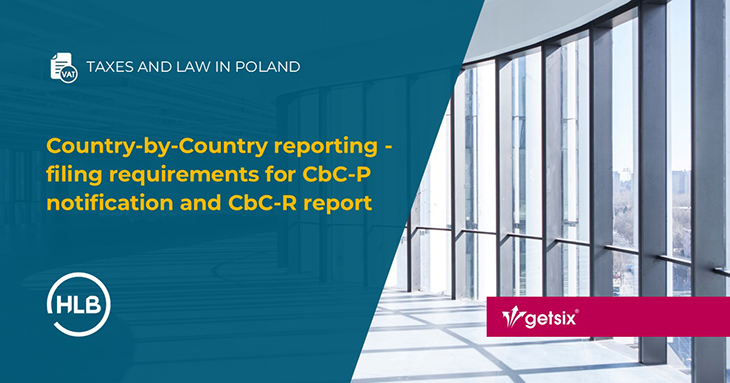Country-by-Country reporting – filing requirements for CbC-P notification and CbC-R report
According to OECD regulations on tax information exchange, multinational corporate groups are required to report their organizational structures and financial results. The purpose of this obligation is to ensure greater tax transparency and to limit aggressive tax optimization practices.
In this article:
What is CbC Reporting?
The primary goal of Country-by-Country (CbC) reporting is to increase tax transparency and combat aggressive tax optimization. This reporting provides tax administrations with a tool to assess risks related to transfer pricing.
CbC reporting helps identify cases of artificial profit shifting to low-tax jurisdictions, assess whether a group’s tax structure aligns with its actual business activities, and improve understanding of global value chains within multinational groups.
Who is subject to the CbC reporting obligations?
This obligation applies to large corporate groups whose consolidated revenues exceed the following thresholds:
- PLN 3,250,000,000 if the consolidated financial statements are prepared in PLN.
- EUR 750,000,000 (or the equivalent of this amount in another currency) if the consolidated financial statements are prepared in another currency.
Threshold amounts for CbC reporting are converted according to Article 82(2)(2) of the Act on the Exchange of Tax Information with Other Countries:
- If the ultimate parent entity is located outside of Poland, conversion follows its’ jurisdiction’s rules (if no such rules exist, the exchange rate below applies).
- If the ultimate parent entity is located in Poland, conversion is based on the last exchange rate published by the European Central Bank on the last day of the financial year preceding the reporting year.
If a group’s consolidated revenues exceed these thresholds, its entities must submit either a CbC-P notification or a CbC-R report.
CbC-P: Notification of reporting
CbC-P is a mandatory notification submitted by entities belonging to corporate groups subject to CbC reporting. The notification provides details about the reporting entity and the country where the CbC-R report will be filed.
Who submits CbC-P?
- Subsidiaries and ultimate parent entities of corporate groups whose consolidated revenues exceeded PLN 3,250,000,000 or EUR 750,000,000 in the previous financial year.
- Other designated entities within the group responsible for reporting.
Deadline for CbC-P submission:
- Within 3 months from the end of the group’s financial year.
CbC-R: the main report
What is CbC-R?
CbC-R is the actual report containing detailed information on the global distribution of turnover, profits, taxes, and other financial data of multinational corporate groups.
Who submits CbC-R?
- The ultimate parent entity of the corporate group that meets the criteria specified in the regulations, in its country of residence.
Deadline for CbC-R submission:
- Within 12 months from the end of the group’s financial year.
How to submit CbC-P notification or CbC-R report in Poland?
Both CbC-P notifications and CbC-R reports must be submitted electronically via the Polish e-Deklaracje system.
Public CbC reporting – new obligations
According to the EU directive, public CbC reporting regulations came into effect in Poland on June 22, 2024. The existing CbC-R reports and CbC-P notifications submitted to the Head of KAS (National Tax Administration) remain unchanged. The key novelty is the introduction of a public report, which will be available in the National Court Register (KRS) and on company websites. This means that information on global revenues, profits, taxes, and other financial data of large corporate groups will become publicly accessible. This marks an important step toward increasing tax accountability and preventing tax avoidance.
One of the main challenges is the requirement for Polish subsidiaries to monitor their ultimate parent entity’s compliance with public reporting requirements. If the parent entity fails to publish the required report, the subsidiary must prepare and publish the report itself.
In such cases, the subsidiary should first attempt to obtain the necessary data from the parent entity. If unsuccessful, it must independently prepare the report using the available financial information.
Penalties for non-compliance
Failure to submit CbC reports or providing incomplete or incorrect information may result in an administrative fine of up to PLN 1,000,000. Tax authorities also have the right to conduct audits to ensure compliance with reporting regulations. Given the dynamic nature on how corporate financial situations can develop, restructurings or investments may lead to exceeding reporting thresholds.
Summary
CbC-P and CbC-R reporting are key tools in combating tax avoidance. Understanding these reporting obligations is essential for large corporate groups.
Since CbC reporting deadlines and regulations may change, it is strongly recommended to consult a tax advisor to ensure full compliance with legal requirements.
If you have any questions regarding this topic or if you are in need for any additional information – please do not hesitate to contact us:
CUSTOMER RELATIONSHIPS DEPARTMENT

ELŻBIETA
NARON-GROCHALSKA
Head of Customer Relationships
Department / Senior Manager
getsix® Group
***














